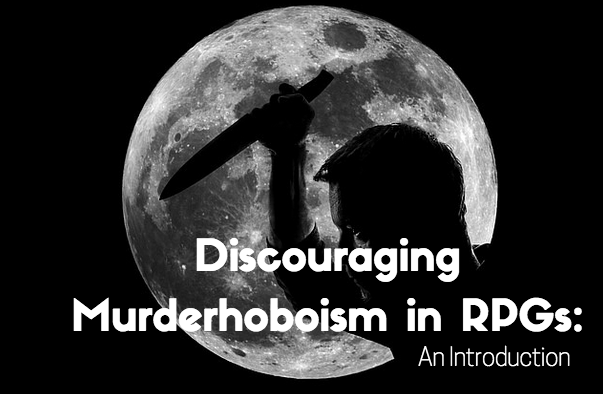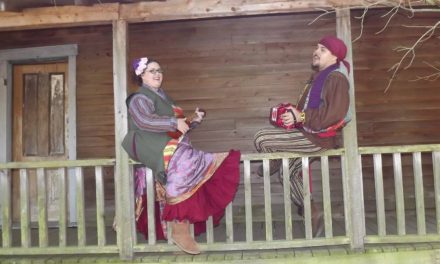Hello – I’m Chris Bell, the RPG editor for The Geek Initiative. In this series of articles I’m going to talk about the insidious phenomenon of Murderhoboism, a thing which takes places at RPG tables when players simply want to be jerks.
The actual term comes from a long-standing joke in RPG and video game culture in that RPG player characters are often depicted (and portrayed as players) as anti-social, homeless vagrants who do nothing but kill for money. It’s the reductionist behavior that we see in video games. While that’s fine for tightly scripted JPRPGs, for paper and pencil RPGs that have multiple human beings playing them, it can lead to a less than satisfactory experience. So, this lead me to write a serious of quasi-article posts as part of Facebook’s Pathfinder RPG group back in early to mid 2015.
The essential problem with murderhoboism is engagement. Players who act like bandits have no connection to the setting. Here, in my 7 part series, I’ll share with you techniques on how to get your players reconnected to your setting, and how to transform them from murderhobos into heroes. As part of my introduction, I’ll include both part 0 and part 1 of the series.
Discouraging Murderhoboism: Families
One way to discourage players from acting like “murder-hobos”, is to give them family relations that they stand accountable to in nearby communities. Even if they are single, knowing that their brother or sister lives on a nearby farm with a family, or that their parents might be merchants with a reputation in a nearby village, can create story hooks that can send PCs off on adventures and behave less antisocially. It’s one thing when the goal is a +1 magic sword to fight help them fight better, but it’s another thing to get gold pieces to help your brother and his family weather the winter when the harvest is bad.
This can be a benefit to the PCs, as well as a responsibility. A family can give the PCs a place to stay, food, and medical care, be a source of rumors, information, and story hooks, and support the PCs when times are bad.
Pathfinder’s Rise of the Runelords Adventure Path makes excellent use of family relations. The Sandpoint setting is a great family drama, and is one of the reasons why this Paizo adventure path has so many fans.
Discouraging Murderhoboism: Ransom
In our world, ransom was a common custom that was used when exchanging prisoners. In the Pavis setting for Glorantha, intelligent non-humans and human combatants always honor the custom of ransom – if an opponent throws up their hands, drops their weapons and says out loud, “I HAVE RANSOM, I SURRENDER,” then that will be honored.
The opposing side will take their weapons, tie them up, and immediately contact the prisoner’s clan, tribe, temple or lord who will then send an appropriate ransom. Usually, oaths are sworn to truth and honor gods so that prisoners needn’t worry about their safety and the captors get paid. No one wants to die, and no sapient being fights to the death when they can live to fight another day.
Only people with blood feuds or extreme religious differences ignore ransom. For the purposes of mechanics, an opponent who surrenders is a defeated opponent who grants full XP value. Usually, in my D&D settings, lawful and good gods severely punish those who do not accept surrender.
In a D&D/Pathfinder context, this means that opponents who call for surrender will give up their treasure in exchange for their lives and the promises of safe passage. In my games, Orcs, Gnolls, and the like are bandits but they usually aren’t cannibals or murderers because they don’t want genocide committed against them. They certainly are still ‘evil’ in the moral sense (they’re violent thieves) but they will take captured humans and sell them into slavery and such. Orcs, Gnolls and Hobgoblins in my setting conduct trade with humans just like nations of evil humans do – evil is the result of actions, not race.
Everyone honors ransom because its common sense, especially if the ransom one can get for a party of adventurers is higher than selling them as slaves and selling their gear off as loot. This also deflates the campaign of excess gold, as PCs are encouraged to ask their temple, lord, or other patron to hold a ransom fund for them in safekeeping. This worked wonderfully in my own game, and can be fun to use in a Pathfinder game.
Of course, various kinds of intelligent monsters (or monsters with no use for money) might not take ransom. Apply common sense.
Join us next time for the next installment in the “Discouraging Murderhoboism” series – High Romance to transform your players from disinterested hoodlums into enthusiastic heroes!
Chris Bell is the RPG editor at The Geek Initiative. You can follow him on twitter at @enthusedgrog.





